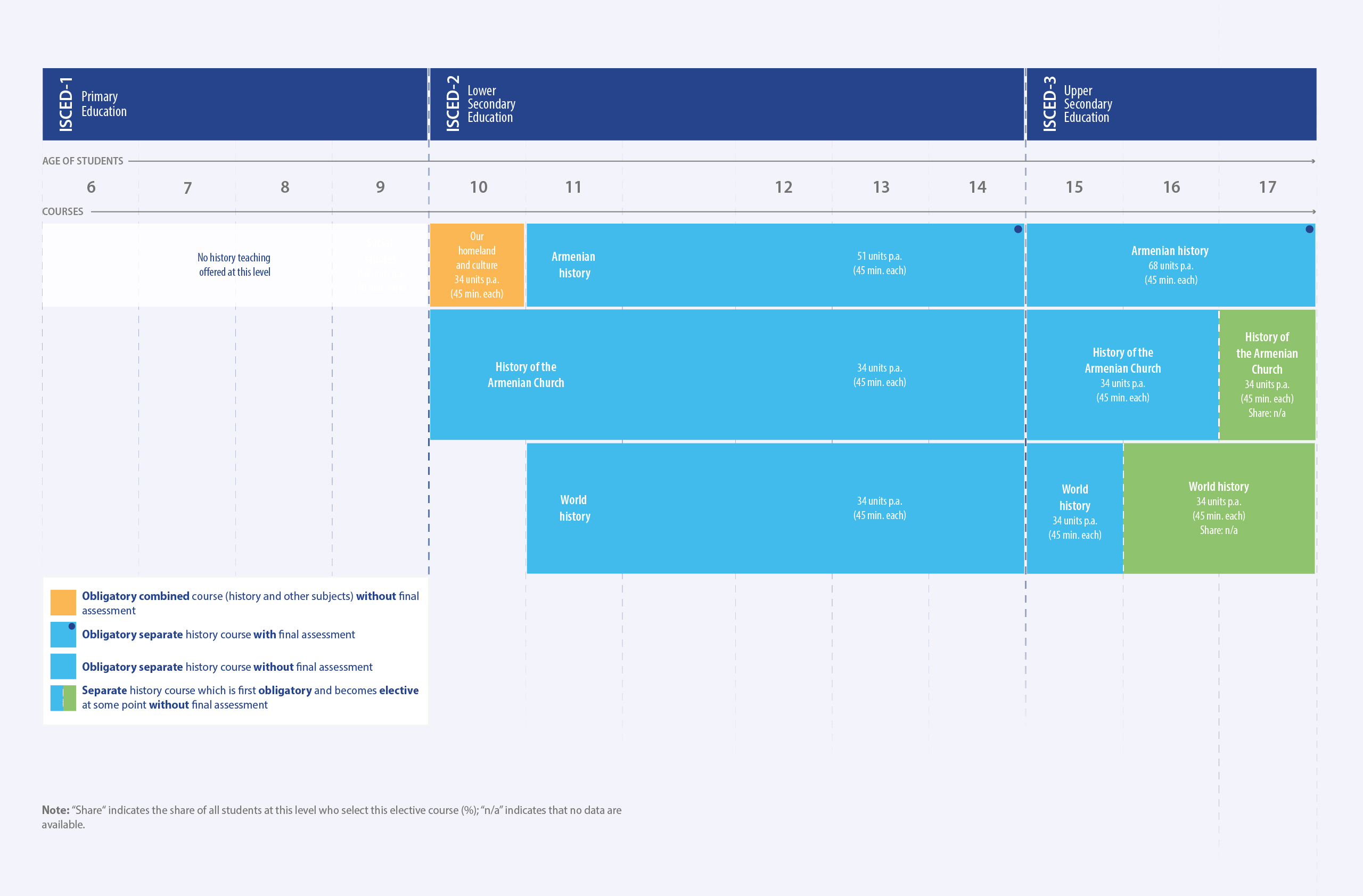
OVERVIEW
In Armenia, history is taught in the form of different courses beginning in the fifth grade, the first year of lower secondary education (pupils aged 10). One course, “Armenian history”, is compulsory from the sixth grade until the last year of upper secondary education, including compulsory end-of-stage exams. Other history courses are compulsory for some years before becoming optional.
The history curricula are organised thematically and chronologically. They are developed by the National Centre for Education Development and Innovation, the Assessment and Testing Centre, the National Centre for Educational Technologies and the Psychological-Pedagogical Centre, with support from civil society organisations. Private schools are required to base their history curriculum on the national curriculum followed by public schools.
Assessment methods include essays, oral presentations, knowledge-based questions, source-based questions and multiple-choice questions. A final exam is taken at the end of the compulsory course “Armenian history” at both the lower and upper secondary level. Schools select textbooks from government-approved options and have the freedom to use materials not licensed by the government without any restrictions. There are no prerequisites for teachers to teach history, and in-service professional development courses are optional.
Download high-resolution schematic
FURTHER INSIGHTS

HISTORY IN SCHOOL
In the fifth grade (pupils aged 10), all students take the multidisciplinary course “Our homeland and culture” and also begin taking “History of the Armenian Church”. The latter course remains compulsory until becoming optional in the final year of upper secondary education. Beginning in the sixth grade, students are also required to take the courses “Armenian history” and “World history”. “Armenian history” is compulsory throughout public schooling, while “World History” becomes an optional course in the final two years of upper secondary education.
History is taught only in the Armenian language. Private schools in Armenia can design their own history curriculum but are required to base this on the existing curriculum for public schools.

HISTORY CURRICULUM
The institutions that control school curricula in Armenia include the National Centre for Education Development and Innovation, the Assessment and Testing Centre, the National Centre for Educational Technologies and the Psychological-Pedagogical Centre. The education authorities reported that civil society organisations also participate in curriculum development, although representatives of minority groups were not indicated to be involved in this process.
|
AIMS REPRESENTED “VERY WELL” OR “QUITE WELL” IN THE CURRICULUM |
PERIODS |
GEOGRAPHICAL SCOPE |
APPROACHES |
|
|
|
|
The authorities report that minority groups (cultural, ethnic, linguistic, national, religious or sexual/gender) are not included in the history curriculum.
Curricula workstation by GEI (History curricula search by country)

ASSESSMENT AND EXAMS
The assessment methods that teachers are required to use are says, oral presentations/ exams, knowledge-based questions, source-based questions and multiple-choice questions.
End-of-stage examinations are taken at the end of the compulsory course “Armenian history” at both the lower and upper secondary level. The content of the examinations varies by region.
End-of-stage examinations assess the following fields of knowledge: historical content knowledge, historical thinking competences (e.g., critical analysis and evaluation of evidence, formulatioand justification of historical arguments, consideration of different perspectives), social and civic competences (e.g., conflict resolution skills, demonstrating empathy, respect for diversity), generic skills (e.g., communication, co-operation, use of ICT).
End-of-stage examinations are oral and written. Oral examinations include open questions to students. Written examinations include open-ended questions, close-ended questions and multiple-choice questions.

TEXTBOOKS AND OTHER RESOURCES
The approval of educational resources to be used in history teaching is granted by the Ministry of Education, which organises open competitions for organisations to produce textbooks according to its prescribed standards. Textbooks that are approved by the ministry as meeting the prescribed standards can be introduced into schools. Schools can choose which textbooks to use, and teachers are permitted to use materials not licensed by the Armenian government without any restrictions.
The use of different types of educational resources (see below) is encouraged:
|
International TextbookCat (GEI collection of Textbooks and Educational Media)

HISTORY TEACHERS AND THEIR EDUCATION
There are no prerequisites for teachers to teach history.
At both primary and secondary level, teachers receive general training to teach across a range of disciplines.
In-service professional development courses are optional. They are provided by the government and administered through the National Centre for Education Development and Innovation.
Armenian Association of History Educators (presentation by EuroClio)
Armenian Center for Democratic Education (CIVITAS) (presentation by EuroClio)
The information in the sections above is an excerpt of the thematic and general data presented in the following OHTE publications:
2022: Pandemics and natural disasters as reflected in history teaching
2023: OHTE General Report on the State of History Teaching in Europe



